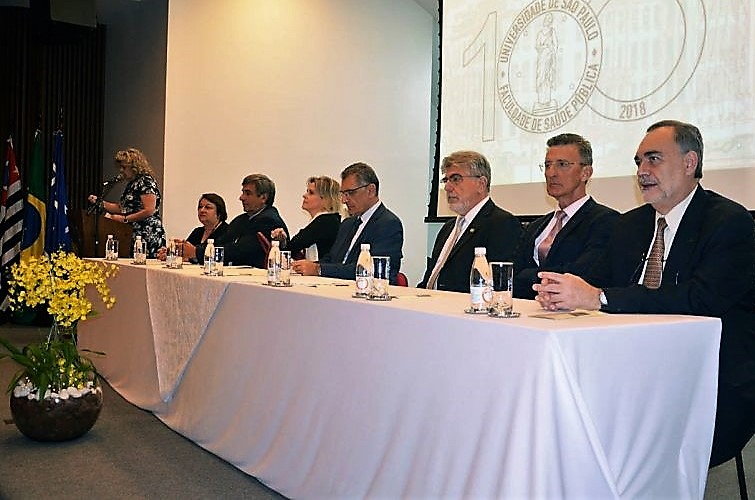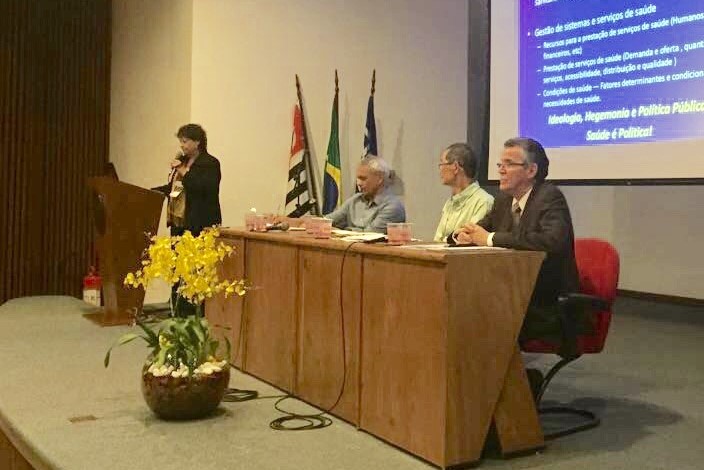The Public Health School of São Paulo (Faculdade de Saúde Pública, FSP) started with as the Hygiene Laboratory, established in 1918 through an agreement signed by the State Government of São Paulo and the Rockefeller Foundation, as a discipline of the Medical School. Four years later, under the leadership of Geraldo Horacio de Paula Souza, the then Hygiene Laboratory was detached from the Medical School and renamed Hygiene Institute, starting a multidisciplinary view on the topic. This view led to the creation of the country’s first primary care center, a building annex to the Institute that served as a reference model for students of the first specialization course in Public Health, directed to physicians, engineers, and other public health professionals. In 1939, Professor Paula Souza opened the first Nutrition undergraduate course in the country, as a strategy to improve the health of industry workers through a balanced diet.
Thus, as of the 1950’s, the then University of São Paulo School of Hygiene and Public Health started to play a key role in disease prevention and epidemic control. After the military regime and the country’s re-democratization process, other Public Health Institutions were created, and the school’s course structure was redesigned due to a decreased demand from public health professionals. It however expanded its action in specific areas, such as statistics—providing important data for PAHO/WHO and occupational health studies.
As of 1969, the Hygiene School changed its name to Public Health School of the University of São Paulo (Faculdade de Saúde Pública da Universidade de São Paulo, FSP-USP). Today, the FSP is structured in fice departments: Epidemiology; Nutrition; Environmental Health; Maternal and Child Health; and Public Health Practice. The institution offers two undergraduate courses, Nutrition and Public Health. Graduate studies include six stricto sensu programs: Environment, Health and Sustainability (Professional Master’s program), Entomology in Public Health (Professional Master’s program), Epidemiology (PhD program), Nutrition in Public Health (Master’s and PhD programs), Global Health and Sustainability (PhD program) and Public Health (Master’s and PhD programs); six Specialization Courses, and six Professional Enhancement Programs.
Scientific Seminar
To celebrate the centennial of this renowned institution, their Director and professors organized an International Scientific Seminar on February 20-23. The event agenda included national and international speakers that discussed, in 12 panels, about health challenges in six dimensions: changes in disease profile and determinants of health conditions; environment and sustainability; health promotion policies; human resources and health systems management; health judicialization and regulation; and health innovation and technology.
The Seminar opening took place on February 20th in a solemn session at João Yunes Auditorium, at FSP-USP. The opening panel brought together the following authorities: Prof. Dr. Vahan Agopyan, Dean of the University of São Paulo; Dr. Wilson Pollara, Municipal Health Secretary of the City of São Paulo; Prof. Dr. Carlos Castilho representing the Board of the Bloomberg School of Public Health, Johns Hopkins University; Ms. Janine Coutinho representing Dr. Joaquín Molina, Representative of PAHO/WHO Brazil; Prof. Dr. Victor Wünsch Filho, FSP-USP Director, Prof. Dr. Jose Otavio Auler Jr., Director of Faculdade de Medicina da USP, and Prof. Dr. Maria Amelia de Campos Oliveira, Director of Escola de Enfermagem da USP. Moreover, public, academic, and scientific personalities and representatives from national and international education and research institutions, in addition to professors, students, and staff from the School, the University, and from other organizations attended the ceremony.
 Prof. Wünsch welcomed participants and highlighted the FSP relevance along the 100 years of its history for health of the population of Sao Paulo and of the country, underlining the importance of the partnership with each institution represented in the opening panel. He also acknowledged the efforts of all those who contributed to the holding of the Celebration Seminar.
Prof. Wünsch welcomed participants and highlighted the FSP relevance along the 100 years of its history for health of the population of Sao Paulo and of the country, underlining the importance of the partnership with each institution represented in the opening panel. He also acknowledged the efforts of all those who contributed to the holding of the Celebration Seminar.
Next, Prof. Auler Jr. drew attention to the countless progresses reached in scientific research in Public Health, and stressed the numerous current and future challenges that will need collaboration through partnerships with the private sector to be overcome.
The Municipal Health Secretary, Dr. Pollara, celebrated the institution’s accomplishments, such as the large diversity of graduate and extension courses offered and the growing interest in keeping the alliance between the City Administration and the FSP to reach health targets for the city.
Ms. Janine Coutinho expressed her pride in taking part in the historical event and underscored the importance of the WHO and the School joint participation to meet the objectives of the Agenda 2030 for sustainable development.
The Dean of Universidade de São Paulo, Prof. Dr. Vahan Agopyan, closed the panel highlighting the capacity of São Paulo leaders along the history to build organizations of excellence, such as FSP-USP, to face emerging problems, such as epidemics. He stressed that FSP-USP is a consequence of the view of these leaders from Sao Paulo throughout history.
It is worth noting that the FSP-USP foundation, then Hygiene Laboratory, in 1918, was partially motivated by the need to control the yellow fever outbreak in the capital of São Paulo state. When one would think that the disease was extinct –at least in the major urban centers – one hundred years later health authorities are once again facing the challenge of fighting the disease.
 BIREME Director, Dr. Diego Gonzalez, participated in the panel entitled Contemporary Challenges for Health Systems, coordinated by Prof. Oswaldo Tanaka, from FSP-USP, with the talk ‘Evidences to Inform on Health Decisions’. Dr. Gonzalez emphasized the main current challenges, like connecting research results and the systematic use of evidence in policy-making, and the need to develop infrastructure, processes, and capabilities that can integrate evidences in the decision-making process. Dr. Gonzalez showed the actions in which BIREME can contribute, both in keeping and making information available, as well as actions in capacity-building and support to the different countries.
BIREME Director, Dr. Diego Gonzalez, participated in the panel entitled Contemporary Challenges for Health Systems, coordinated by Prof. Oswaldo Tanaka, from FSP-USP, with the talk ‘Evidences to Inform on Health Decisions’. Dr. Gonzalez emphasized the main current challenges, like connecting research results and the systematic use of evidence in policy-making, and the need to develop infrastructure, processes, and capabilities that can integrate evidences in the decision-making process. Dr. Gonzalez showed the actions in which BIREME can contribute, both in keeping and making information available, as well as actions in capacity-building and support to the different countries.
Links of interest
The School of Public Health by Mariana de Carvalho Dolci and Patrícia Helen de Carvalho Rondó, talks about the FSP/USP trajectory along these 100 years.
FSL Timeline, published on the school’s new website, reports the major facts that took place in the history of FSP/USP from 1918 to 1968.